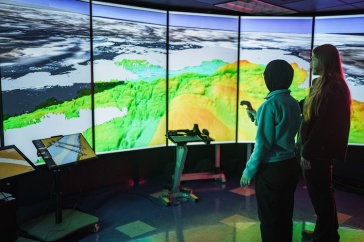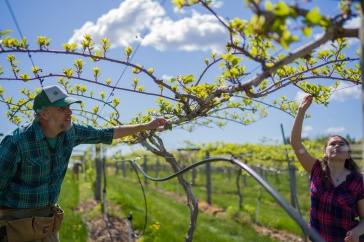
Professor Kenneth Johnson.
Kenneth Johnson, a researcher with the New Hampshire Agricultural Experiment Station in the College of Life Sciences and Agriculture and a professor of sociology in the College of Liberal Arts, has been honored as part of a multidisciplinary multi-institution research team that was recently awarded the National Excellence in Multistate Research Award from the Association of Public and Land-Grant Universities and the USDA.
This prestigious and highly competitive award recognizes scientists who conduct exemplary research and outreach efforts across multiple states and in doing so enhance the visibility of USDA multistate programs. The team was awarded the Western Region Excellence in Research Award this summer and received their award at the APLU/USDA national award ceremony, which took place virtually Oct. 28.
The project, known as W4001: Social, Economic and Environmental Causes and Consequences of Demographic Change in Rural America, conducts research on the most pressing demographic, economic, social and environmental challenges faced by rural communities in the United States. As part of a team that includes 39 scientists at 28 institutions, Johnson looked at demographic change in rural America as well as regional demographic trends in New Hampshire and New England.
“There are many excellent research projects that focus on developing new technologies and practices to help overcome challenges faced by agricultural producers and processors. However, the adoption and effectiveness of those solutions really depend on our understanding of how social and behavioral dynamics in rural communities affect the implementation of science-based knowledge. Social scientists associated with the W4001 multistate project work on developing exactly this type of understanding," said Anton Bekkerman, the director of the New Hampshire Agricultural Experiment Station and the administrative advisor to W4001 who helped support the writing and submission of the award nomination.
"The research of the W4001 team has become even more urgent and relevant with the COVID-19 pandemic and associated health, social and economic challenges faced by rural America. This award is a timely and important national recognition of these social science efforts," he said.
Demographic change influences health care, education, the labor force, social organizations and the environment, according to Johnson, who holds a UNH Class of 1940 professorship and is senior demographer with the UNH Carsey School of Public Policy. By working with a team of demographers studying population change in rural and urban areas across the United States, he can compare the demographic changes occurring in New Hampshire to those in the region and elsewhere. He then uses these national trends to provide context and perspective to what is happening in New Hampshire and New England.
“Demographic change is so fundamental to the future of New Hampshire that it is imperative that planners and policymakers be aware of how the state is changing demographically. It helps them to plan and develop policy to address the future needs of the state, whether it is health planners trying to decide what services to add to hospitals, school boards trying to decide whether to build new schools or close existing ones, or regional planners trying to make decisions about how to expand the infrastructure of the region,” he said.
New Hampshire has one of the most mobile populations in the country, Johnson said. Only 42 percent of the state’s residents were born in New Hampshire, and only 33 percent of those over age 25. Because the birth rate in New Hampshire is low and the population is older, there are few, if any, more births than deaths in the state. Thus, if New Hampshire is going to gain population, it must be because more people move to the state than leave it.
“I speak frequently to policymakers and business groups about this issue and about who is moving to the state and what makes them decide to come to New Hampshire. I advised a state demographic planning panel mandated by the legislature to make a plan of action to address the state’s future demographic situation and the topic of migration was a central focus of their work,” he said.
In recent years, W4001’s research has helped address multiple major national health crises. For example, the project has provided essential information about the effects of the COVID-19 pandemic on rural communities, guiding states’ social distancing policies, resource allocation, testing and reopening strategies. Additionally, this project was the first to identify rising rural opioid overdose rates and explanations for those trends. This information shaped national legislation, influenced the design of an interactive data visualization tool that helps communities assess and respond to the overdose crisis, and led to rapid resource allocation.
W4001’s research has informed anti-poverty policies, including changes in official measurements of poverty and underemployment and the distribution of safety net resources. Project members were the first to discover that rural populations are shrinking due to young adult outmigration, fewer births and increased mortality. Researchers created a database that details county-level age-specific net migration trends. Hundreds of thousands of regional planners, insurance companies, school districts, senior housing developers, public health agencies and other stakeholders have used the database to understand rural needs and market demand and to inform infrastructure development and resource allocation.
In the last three years, the team of researchers has produced hundreds of peer-reviewed publications, developed numerous public briefs, secured more than $13 million in research funding, led workshops for community organizations, delivered more than 200 presentations to stakeholders, including the U.S. Congress and the National Institutes of Health, and consulted for experts in multiple state and federal agencies.
Johnson has spoken with state legislative committees about New Hampshire’s demographic trends, participated in a congressional briefing in Washington, and communicated with congressional staffers about demographic issues relevant to the state, region and country. In addition, he has discussed the state’s demographic trends with business and industry groups, nonprofit organizations and interest groups.
“The support provided by the agricultural experiment station has been critical in facilitating my ability to examine demographic trends in New Hampshire. It supports my participation in the W-4001 Multi-state Regional Project that brings together rural demographers from across the country to discuss state and regional demographic trends. It has allowed me to train and support students who have served as research assistants on my agricultural experiment station project. It has allowed me to acquire the data and statistical tools I need to do the detailed analysis necessary to understand the complex social, economic and demographic forces that influence the currents of demographic change that influence both urban and rural New Hampshire. And support from the station also facilitates my outreach efforts both through funding my publications and my travel to present my findings to interested groups throughout the state, region and country,” Johnson said.
Related Research
U.S. Population Growth Slows, but Diversity Grows
U.S. Population Growth Shrinks to Lowest Level in 100 Year
Migration is Biggest Driver of Population Change in New Hampshire
Younger People Moving to New Hampshire on Rise
Great Recession Changed U.S. Migration Patterns
This material is based upon work supported by the NH Agricultural Experiment Station, through joint funding of the National Institute of Food and Agriculture, U.S. Department of Agriculture, under award number 1013434, and the state of New Hampshire.
-
Written By:
Lori Gula '06G | NH Agricultural Experiment Station | lori.gula@unh.edu

















































